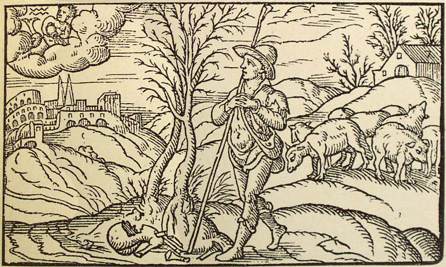Seasons awry: land enclosures
The Porter in Macbeth lets into Hell a paradoxical figure: "a farmer that hanged himself on th'expectation of plenty*." The price of wheat was unpredictable; in a good season it would fall, and thus those who had saved from the previous season would lose.
It was increasingly profitable to raise sheep, for wool rather than for mutton. Farms were taken over by landlords, and fenced in so that sheep could graze where wheat had grown*.
Thousands were thus thrown out of work; the pastoral image* of the shepherd tending his flock concealed a less attractive truth of poverty and unemployment.
Footnotes
-
Hoarding food
Macbeth, 2.3.4-5. Such hoarding of grain was one of the causes of unrest which culminated in the Midlands Revolt of 1607, about the time Shakespeare was writing Macbeth.
-
Obselete labour
A further reason for an increasing number of unemployed ("masterless men") was that farming techniques were becoming more sophisticated, and new technologies were making it less labour-intensive.
